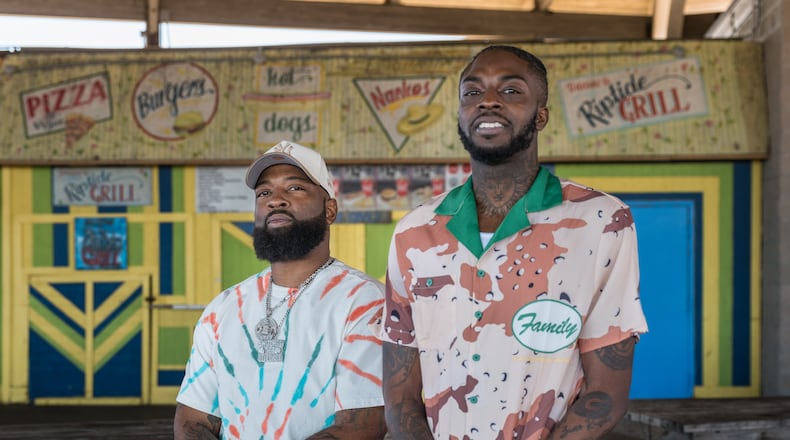TYBEE ISLAND ― Orange Crush’s return to its roots — as a professionally organized and city-sanctioned spring break beach festival for Black college students — may be a one-and-done success, at least under the Orange Crush name.
Friction between the festival operator, Steven Smalls, and the Orange Crush trademark owner, George Ransom Turner III, is now a public feud.
In an email sent to The Atlanta Journal-Constitution this week, Turner demanded a $50,000 licensing fee from Smalls to use the Orange Crush name for next year’s event. In response, Smalls said he will legally challenge Turner’s trademark ownership “as his actions have damaged the brand and undermined the positive direction we’re building.”
Smalls and Turner partnered on Orange Crush 2025, held Saturday at Georgia’s most popular beach. An estimated 30,000 historically Black college and university students and other young adults visited Tybee Island throughout the day, with many taking in a music and cultural festival complete with a stage and VIP areas.
The day concluded without the violence, property damage and traffic issues that have tainted Orange Crush for much of the last 35 years. The event started in 1989 as a spring break party sponsored by students of nearby Savannah State University. After the HBCU ended its involvement following the 1991 gathering, Orange Crush evolved into a rogue free-for-all promoted by word-of-mouth and social media that attracted more than just college students.
Tybee-elected officials long attempted to curb what they classified a public safety threat. They renewed those efforts after the 2023 Orange Crush, when an estimated 111,000 partyers visited the island for a weekend marred by violent incidents.
Smalls and Turner began planning for a sanctioned festival in the months that followed. They submitted an event permit application last November and received final approval in March.
Shortly after the permit was issued, Turner stopped attending weekly check-ins, city officials said. Turner was likewise absent on festival day, at least among the event management team. Smalls was asked Saturday about Turner’s involvement and replied that the trademark owner was no longer part of the organization.
Turner, a Savannah native who now lives in Atlanta, resurfaced with the email to the AJC on Tuesday. He responded to an interview request made Tuesday with another email saying he and Smalls’ relationship “is fine.”
On Wednesday, Turner emailed a screenshot of a text message thread between the two regarding the licensing fee. In that exchange, Smalls tells Turner to sell him the trademark. He notes that he tried to build up Orange Crush with Turner but that Turner thinks the event is “worth millions when we broke …”
Turner responded by texting Smalls a sales offer: $50,000 a year to lease the Orange Crush name or $350,00 to sell the trademark, with a deadline of May 1.
Smalls, who is based in Jacksonville, issued a lengthy statement Wednesday in response to inquiries about Turner’s demands. Smalls said he distanced himself from Turner because his involvement “was scaring away support” for Orange Crush from Savannah-area businesses and clubs, and that Turner’s reputation is “severely tarnished.”
Turner has organized unofficial Orange Crush events in the past, including a 2019 house party that led to his arrest.
Smalls also said he suffered a financial loss with Saturday’s event. He did not disclose financial details, but in March, he estimated expenses would exceed $200,000. Costs included the stage, sound system and other event-day infrastructure, as well as security and sanitation.
Credit: NATRICE MILLER
Credit: NATRICE MILLER
Meanwhile, the Tybee city government restricted Orange Crush’s revenue opportunities. The organizers were prohibited from limiting attendance to ticket buyers — the stage was positioned on a public beach — or selling alcohol. They also were barred from selling space to vendors in the festival area.
“The Orange Crush Festival, as I have structured it, is not about making a quick buck,” Smalls wrote in his statement, adding he is “committed to making this festival a national example of how we can merge culture, commerce and community.”
Smalls did sell sponsorships, including one to energy drink giant Red Bull, as well as Orange Crush-themed merchandise, water and fruit drinks on-site. The festival also included VIP areas, where ticket holders could sit in chairs or stand at high-top tables under the shade of tents.
Still, many beachgoers were unaware of the festival before their arrival, and some scoffed at the idea of paying between $20 and $250 to listen to music that could be heard clearly outside the stage area. Kylah Heines, a recent college grad who lives in metro Atlanta, said she came for the scenery — eyeing a trio of shirtless men nearby — and not an organized festival.
Yet the stage and the music drew a large crowd in the late afternoon and early evening. Afterward, Smalls called the festival a success and pledged a return in 2026. In a Facebook post Tuesday, he thanked Tybee officials and residents and wrote, “This is just the beginning … Stay tuned!”
Tybee officials declined to comment on the disagreement between Smalls and Turner and what it could mean for Orange Crush’s future. Following Saturday’s festival, Tybee Mayor Brian West called the event a success and said it reflected the “new attitude” local officials and residents had hoped for.
Police made 22 arrests, including one where authorities seized an assault rifle, and wrote 22 traffic citations from Friday through Sunday. Last year, 54 people were arrested and 116 motorists were cited over Orange Crush weekend.
About the Author
Keep Reading
The Latest
Featured


